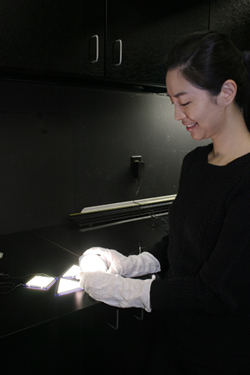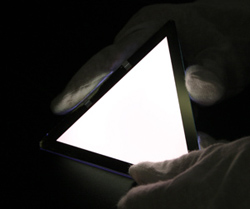The Lighting Research Center (LRC) at Rensselaer Polytechnic Institute is expanding its research, education, and industry activities to organic light-emitting diodes, also known as OLEDs, by establishing the OLED Lighting Education and Application Program (OLED-LEAP) at the LRC. The goals of this new program are to help New York-based companies develop energy-efficient OLED lighting products and to help create market demand for lighting products that deliver value.
The New York State Energy Research and Development Authority (NYSERDA) provided support for this initiative.
 |
|
A woman handles OLED luminaires. (All photos courtesy of The Lighting Research Center (LRC) at Rensselaer Polytechnic Institute) |
OLED technology has advanced rapidly in recent years, with high-performing products now beginning to enter the marketplace for certain niche lighting applications. The thin, flexible structure of OLED panels provides new opportunities for innovative lighting products, and steady OLED efficiency improvements are expected to make OLEDs a viable, cost-competitive option for many lighting applications within the next five years.
“OLED lighting represents a great opportunity for early product development and business growth, but small manufacturers often do not have the resources to dive into the complexities of this emerging technology,” said LRC Director of Research, Nadarajah Narendran, Ph.D., who will head the LRC’s new initiative.
Through OLED-LEAP, the LRC will collaborate with New York State manufacturers who wish to create successful, energy-efficient OLED lighting products for promising applications. Under this new program, the LRC will be able to offer lighting fixture manufacturers and OLED companies technical design guidance, prototype evaluation, performance testing and measurement, and professional education on this state-of-the-art technology. Manufacturers participating with OLED-LEAP also will benefit from contact with a synergistic network of companies, both within and outside New York State, that produce or purchase complementary components for OLED lighting.
“Through this program, companies will learn how to develop lighting systems that will best take advantage of the unique characteristics of OLEDs and deliver greater value to users,” said Narendran.
 |
|
Close up of a triangular OLED panel. |
The LRC will help participating companies understand the needs of lighting applications, including the basics of the technology, system integration issues, performance measurement, human factors, and application research. Other benefits of program participation include access to LRC experts, showcasing of participants’ products at LRC facilities and educational programs, small group discussions to refine product designs, and potential for product demonstration and performance analysis in field research.
In addition to individualized assistance, OLED-LEAP participants will become part of a committed group of companies working together to advance the OLED lighting industry. Companies will benefit from group networking meetings designed to share research findings and opportunities to select new research projects that leverage funds from all participants.
For more information about the OLED-LEAP program, its benefits, eligibility criteria, and co-funding requirements for New York-based companies, visit http://www.lrc.rpi.edu/programs/solidstate/OLED-LEAP.asp.













